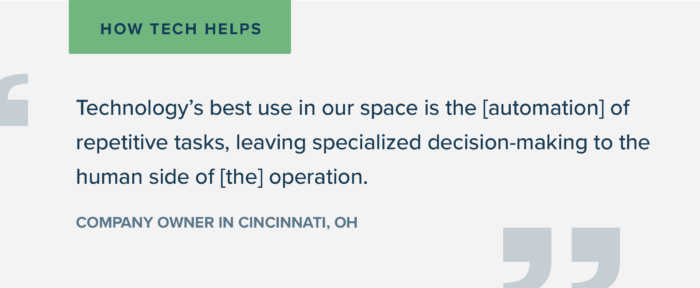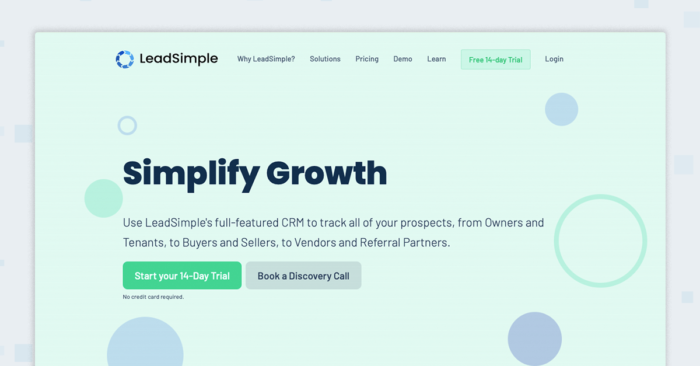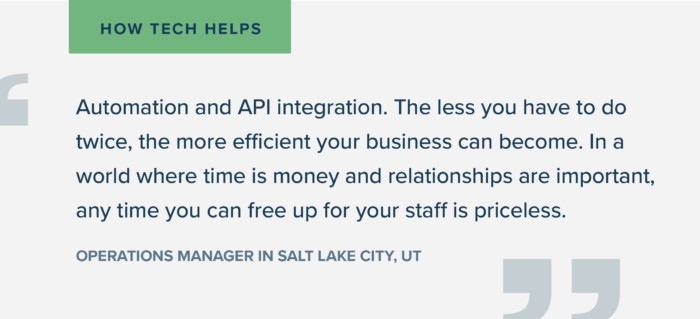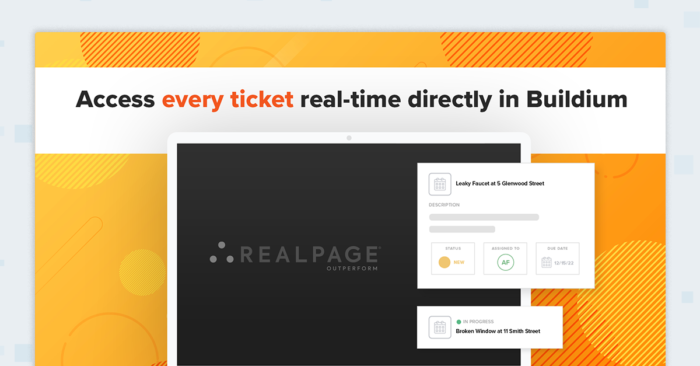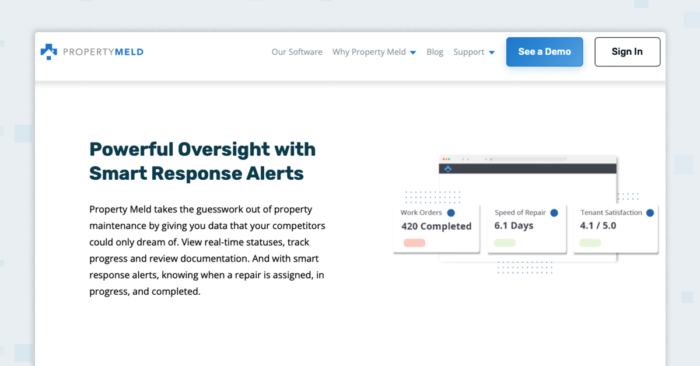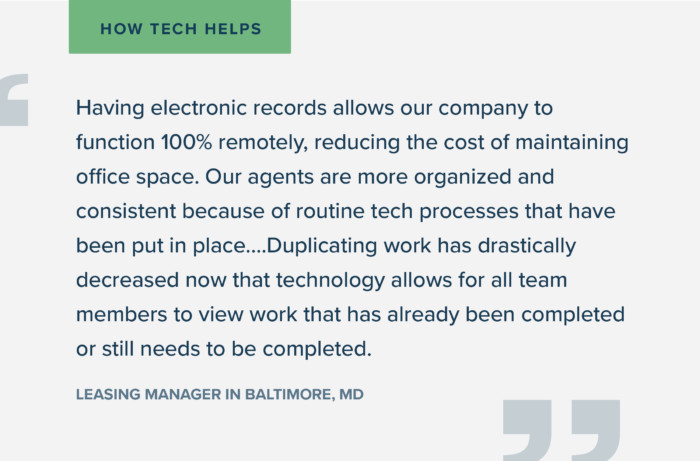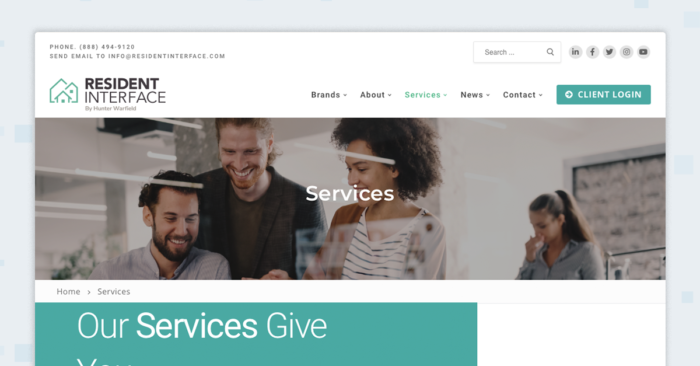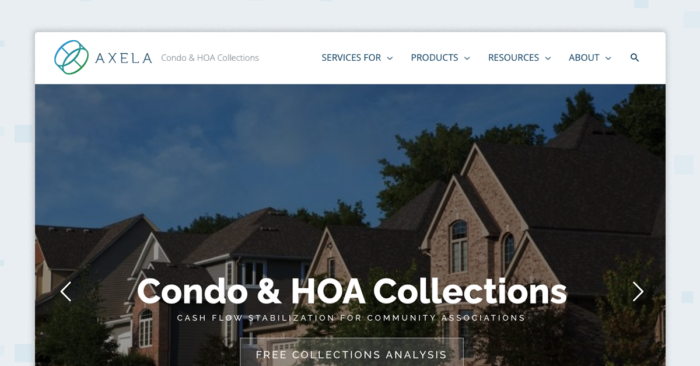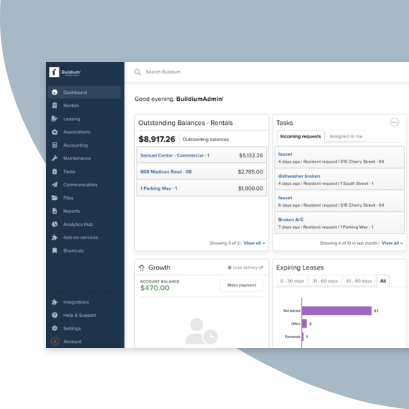Property management is fundamentally about people. To succeed, you have to nurture strong relationships, not just with owners and residents, but also with the vendors, contractors, and team members you work with every day.
To really focus on those important relationships, you’ll need an efficient way to handle all the nuts and bolts of the business—from paperwork and accounting to applicant screenings and property inspections. That’s where technology comes in.
The past few years have seen an almost overwhelming number of digital tools grow in popularity, each promising faster and smarter solutions to help you manage your business. We’ve put together this guide to help you sift through your options to find the technology that actually solves your specific challenges, saves you money, and frees up time for you to focus on what matters.
How to Approach Property Management Software
A word of caution before jumping into the tools available to you: there’s no hard-and-fast rule on which software can get you the most value, nor is there a definitive list of solutions you should go out and purchase today. Instead, a smart investment starts with knowing your business and where you need the most help.
Take some time to audit your operations. Which tasks are taking up the most time? What kind of complaints have you received in the past from owners, vendors, staff, and residents? What obstacles are stopping you from growing where you want to, or from winning new business?
These are the areas where you’ll see the most benefit from new tech because, like any tool, the most effective software is the one you actually use.
The Secret to Doing More with Less
Running a property management company means planning for the unexpected and protecting your business through all the tosses and turns of the rental market.
Luckily, many property managers are finding an edge by focusing on technology that helps them do more with less. Efficiency is an important barometer to keep in mind as you explore the options out there. Ask yourself if, after the initial learning curve and onboarding, the tool you’re investing in will save you time in the long run.
Tools for Every Task
In our latest Industry Report, which pulls from thousands of survey responses from property managers, owners, and residents, we identify the most common types of technologies used in the business today. Here are the top 10:
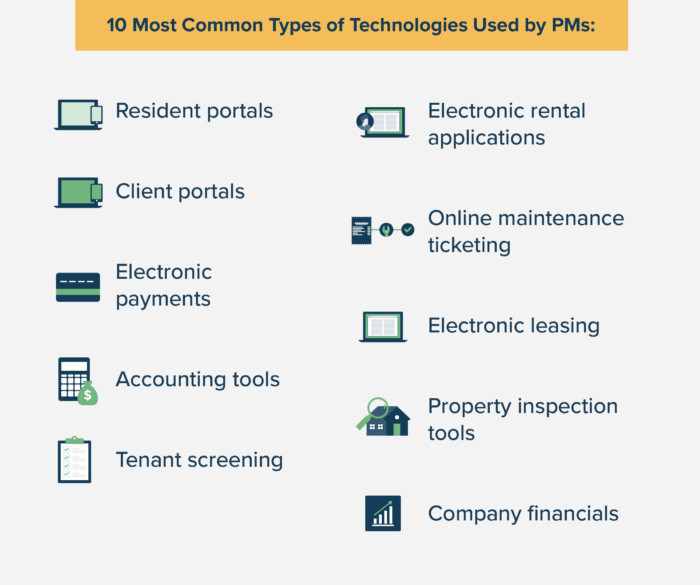
As we’ll explore, many owners and residents have come to expect these technologies and the convenience that comes with them. Other tools that will likely become commonplace over the next year include renter-focused services like self-service showings, virtual tours, and a maintenance contact center for residents, along with operational software for areas such as customer relationship management (CRM) and business analytics.
Don’t worry. You won’t need separate solutions for each of those areas. What you should consider, however, is how well your tools integrate with each other.
Why Your Tech Should Work Together
The combination of technologies your business uses, also known as a tech stack, is only as strong as its weakest link. Outdated accounting software, for example, might mean you’ll be doing a lot of number crunching and repetitive tasks, entering information from the services you use to record rent collection and vendor payments, keeping your different operating and client accounts in order, and drawing from separate sources of data to create reports for owners.
Most of that work is unnecessary if the tech you choose automatically links up to your payment software and lets you sort and share data using the same familiar tools. You’ll be able to cut down on human error and reduce the time it takes to get team members (and yourself) up to speed on new features.
That’s the power of integration, and it’s not just for your benefit. Property management software that’s unified in a single platform, or at least works well together, leads to a seamless rental experience for your residents and professional, transparent communication for owners.
Now, let’s take a closer look at the different types of property management software and how each can help your business.
Leasing Technology
Attracting and retaining residents is a top priority for most property managers. Finding tenants that will stick with you for the long term can be difficult, but technology has emerged over the past few years to make the search easier. The COVID pandemic and remote work has sparked a demand for new technology at each stage of the leasing process.
Marketing and Listing
You’ve put time to create an attractive rental listing and you’ll want to get it in front of the right renters. That means posting your listing on a variety of the leading listing sites such as Redfin, Zumper, Apartments.com, Apartment List, and the Zillow Rental Network. To know which to focus on, here’s the lowdown on the 7 best rental listing sites for property managers.
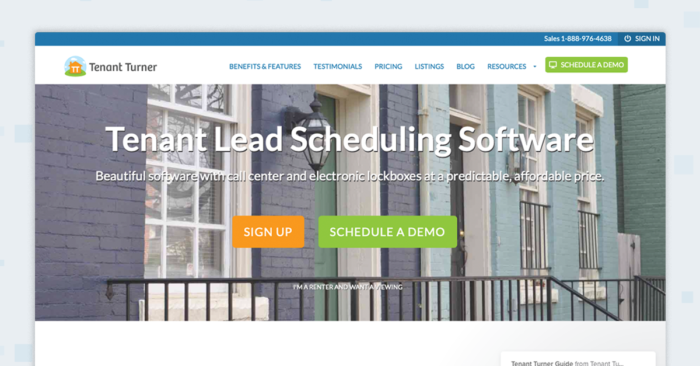
Listing syndication tools like Tenant Turner can help speed up the process by posting each of your listings across the sites of your choice at the same time. The best of these tools save previous information you entered in case you need to relist a unit, but still let you change whatever details you like, such as the point of contact for a listing.
Showings
After finding your property, the next step for many residents is booking a showing. The same tools you used for syndicating listings should let you track any requests and schedule showings, as well. No matter which particular site renters found your listing and requested a showing on, you should be able to manage everything on one platform.
By this point, renters should already have a good idea of what to expect from your property through an effective listing that includes virtual tours.
As you probably know, virtual showings have become commonplace—and even preferred by some renters. In fact, 90 percent of respondents in a Zumper survey said they’d be more interested in a listing that offers a 3D virtual tour than one that doesn’t.
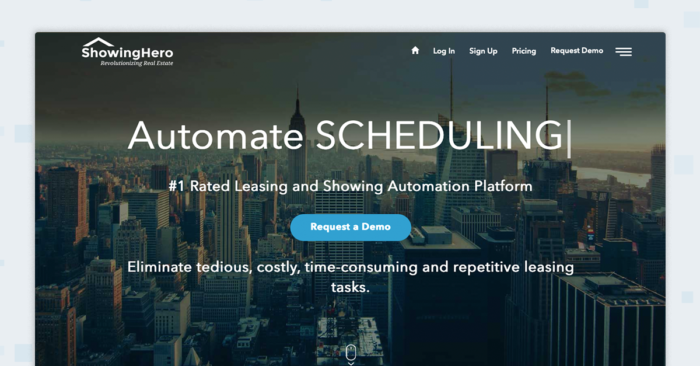
ShowingHero is an example of software that combines these self-tour options with more comprehensive showing management, acting as a virtual assistant, fielding requests from renters and scheduling appointments for you.
Applications
Once renters have seen what they need to, technology can make applications easier for everyone involved, getting more potential residents in front of your team and helping you filter through them and respond to applicants faster.
There are several tools out there that let you share and fill out applications digitally, complete with eSignatures, but why not take it a step further? Opt for software that lets you save templates and customize them without having to create a brand new document for each lease.
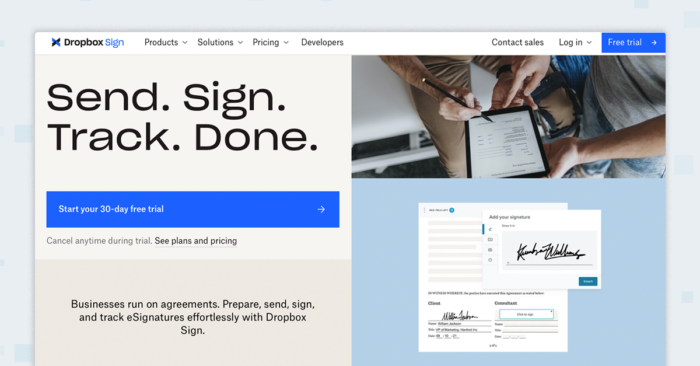
You’ll also want that software to keep all your applications in one place so you can review them quickly and have them on file. Dropbox Sign, combined with Buildium’s leasing features, lets you do all of this.
Remember, this could be a potential new resident’s first experience working with you, so communication is key. The tool you use should let you set up automated messages, letting applicants know when each document has been received and is being reviewed. No more missing out on your ideal renters from delayed responses.
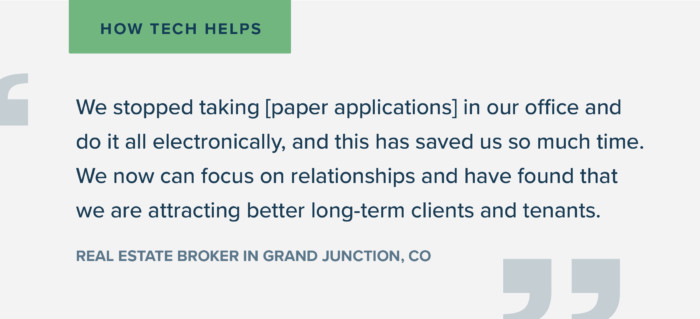
Screenings
Speed is important when it comes to screening tenants, but you also have to be thorough. Tenants screening tools that can run background and credit checks from trusted agencies like TransUnion helps you do your due diligence quickly.
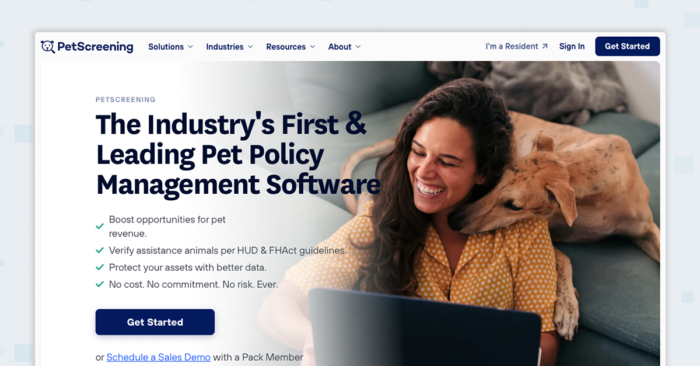
This is also the time to consider what other factors to screen for. Too often, property managers create outright restrictions on things such as pets when, alternatively, a smart, tech-enabled screening can open the door to more potential residents without putting you or your property at risk.
Just like hearing about the status of their applications, renters appreciate timely updates to screenings and the ability to submit any information using the same online platform.
Inspections and Security Deposits
Site visits and walkthroughs with each new tenant can be time-consuming for your team, and that’s only after you’ve gone through the process of putting together the inspection checklist and paperwork.
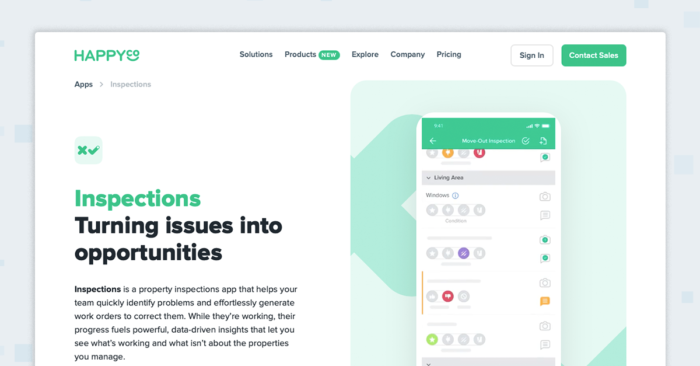
Third-party apps like HappyInspector, offer intuitive move-in inspection forms that you can adjust to match the layout and specifications of your units. Designating whoever you choose to conduct the inspection, you can fill in your customizable form on a phone, snapping any pictures where relevant, and share all the details with members of your team.
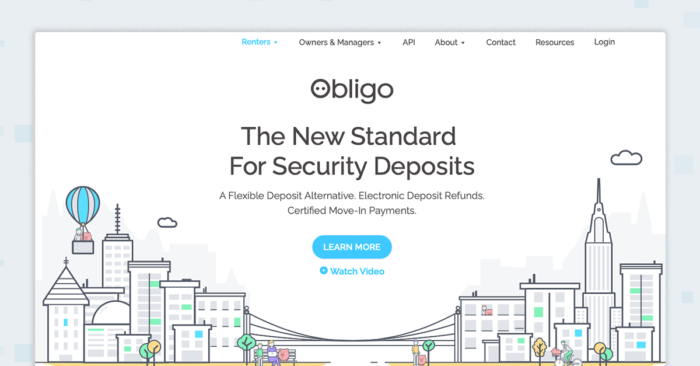
Other tools, such as Obligo, give you the option to either collect a traditional security deposit (processing payments and refunds for you) or offer a deposit-free option, where you can bill tenants for any damages either during or at the end of a lease.
Having this option can eliminate security deposit sticker shock—a major hurdle for many renters—making your property instantly more attractive, while ensuring you get paid if anything goes awry.
Rent Payments and Move-In
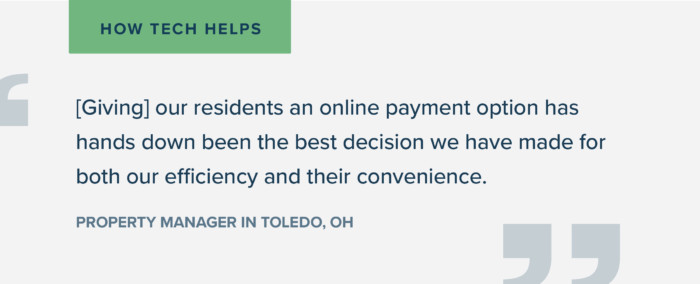
Since 2021, the number of renters who say they’d prefer to pay their rent electronically grew by 26 percentage points. That’s a huge increase no property manager should ignore. If you’re not doing so already, offer online payment options to your residents to stay on par with your competition.
Here are the payment types that have grown the most in popularity recently:
- Venmo, PayPal, Zelle & similar payment tools
- Electronic bank transfer & ACH
- Credit cards
But why stop at what your competitors are offering? You can stand out and save your team valuable time by offering payments through an online resident portal. You’ll be able to keep a record of on-time and late payments automatically , sorted neatly within the same platform you use to manage the property as a whole.
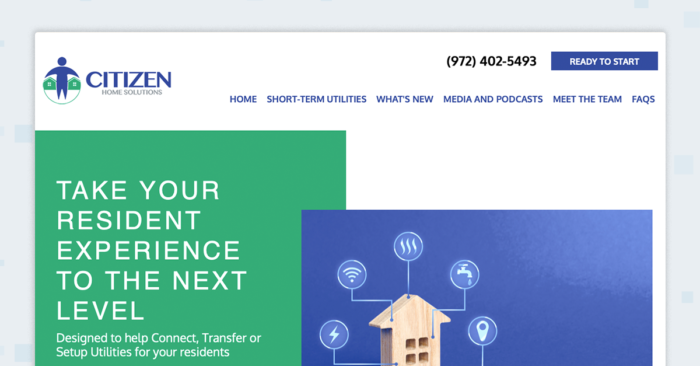
You can also make the move-in process easier for residents by using tools such as Citizen Home Solutions, a free-to-use service that helps residents set up their utilities faster. It’s a convenience that could set your brand apart and become an additional source of revenue for your business.
Communication Tools
As of 2022, 83% of renters and 80% of owners are comfortable taking care of at least some tasks online. This is most likely born out of necessity (social distancing required during the pandemic) and a demographic shift as more Gen Z and digital-native renters and owners join the market.
Regardless of the cause, residents and owners are looking for easier ways to get a hold of you, and there are some simple tools that make that possible.
When it comes to communicating with the individuals you work with every day, property management software is all about consolidation—one platform you can access from anywhere to receive and respond to requests, share updates, check in with your team, and ensure your business is running smoothly.
With Residents
The same resident portal feature that makes online payments easy can simplify your communication with residents, too. The portal (or any other resident communication tool you invest in) should be multipurpose, allowing residents to reach out to you or other property managers on your team, submit a maintenance request, and learn about any important news related to their unit, building, or the resident community, if one exists.
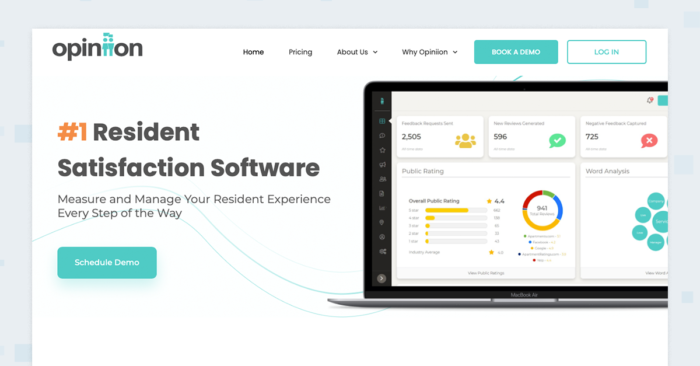
Resident communication tools can also give you valuable feedback you can use to hone your services and make your business more efficient and profitable. Services like Opiniion give renters a quick and easy way to share their feedback at different stages of the leasing lifecycle, from tours and move-ins to work orders and move-outs.
This type of automated, non-intrusive survey tool helps you better understand the resident experience without having to do any of the investigative work yourself.
With Owners
The software you choose to set up your resident portal might also offer a similar owner portal that lets you share vital business information with your clients, minus all the emails, texts, and phone calls. Having their own dedicated portal lets owners access data in real time, without having to go through the effort of contacting your team first.
Be sure that you’re able to customize the types and extent of information owners can view, however, as you’ll want to make sure they’re getting the clearest view of their property’s health, with only relevant data used to paint the picture.
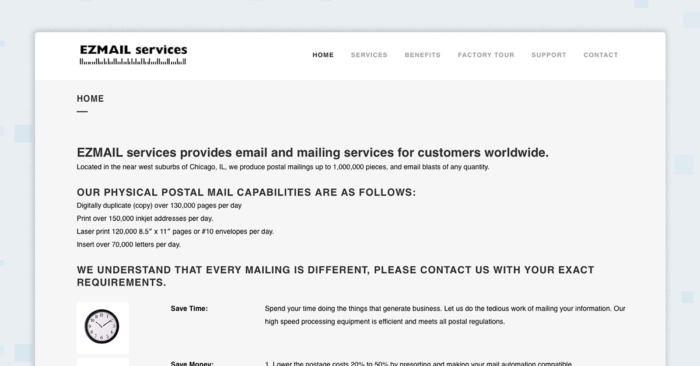
Security is also important, since you’ll be storing and sharing sensitive documents online. Whenever you need to send physical documentation, the right portal will have your files secure and ready to go, and you’ll be easily able to print and mail notices with services like EZMail.
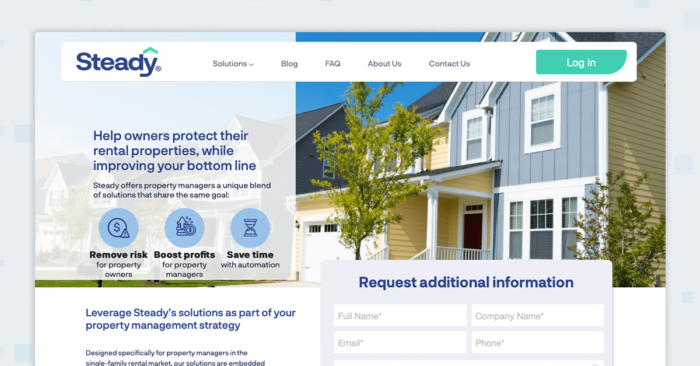
Steady is a solution that takes things a step further, offering benefits packages and rent protection options to owners while keeping them informed through essential legislative updates and quarterly reports.
With Your Team
To tackle all the communication with residents and owners, you’ll want to have your team on the same page. The easiest way to do this is to use the same online platform for both external and internal communication. Team members won’t have to learn new programs or adjust to the quirks of one tool before hopping over to another. Instead, your entire business will have a single source of truth for every request, team correspondence, and client record.
Make sure the platform you use is easily accessible from both desktop and mobile, since property managers and the partners they work with are always on the go.
Popular messaging, collaboration, and videoconferencing software may seem like the obvious choice, especially for larger teams, but look at your options with the broader context of your business in mind. How well do these options integrate with the software you use for showing scheduling or maintenance requests? The more integrated your internal communication system is, the fewer redundant messages and lost requests you’ll experience.
Property Management Accounting Software
Every business uses some kind of software for accounting, whether that’s a simple spreadsheet or a more complex platform. If you’re in the property management business for the long term, you’re going to want technology that adapts to meet your needs. You’re also handling other people’s money, be they owners or residents, on a daily basis, so you’ll want tools that can keep your various accounts separate and in order.
For those reasons—and several others we discuss here—purpose-built property management software for accounting is your best bet.
Taxes
Tax season rolling around isn’t usually a cause for celebration, but it also doesn’t have to be a source of anxiety—if you’re equipped with the right tech.
Beyond standard business tax forms, property managers have to be prepared to file both 1099-MISCs and 1099-NECs, a task that becomes considerably easier with an eFiling tool.
The best solutions automate this process, totaling amounts based on the ledgers you have stored, auto-filling 1099 forms for you, then letting you review and make adjustments as needed before filing the completed forms and sending out copies to the relevant parties. You can have your forms ready to go well before filing even opens in January.
This kind of service is only possible with software that’s built for the specific needs of property managers. Sure, you can rely on more general accounting products or outsource the work to an accountant, but purpose-built tools are designed to give you more security, peace of mind, and value in the long-run. The benefits also add up if you’re using the same tools for year-round accounting.
Everyday Bookkeeping
Accounting software isn’t just for tax season. If you choose a platform that lets you not only file taxes, but also keep your books in order and manager accounts in one place, you’ll be able to reconcile rent payments, property fees, and any other transactions, without having to worry if a specific charge or deposit has slipped through the cracks.
When the time comes to spin up a report, you’ll be able to do so automatically with the right property management accounting software. You’ll have a secure digital record of every transaction, making it easy to trust your numbers and stay compliant.
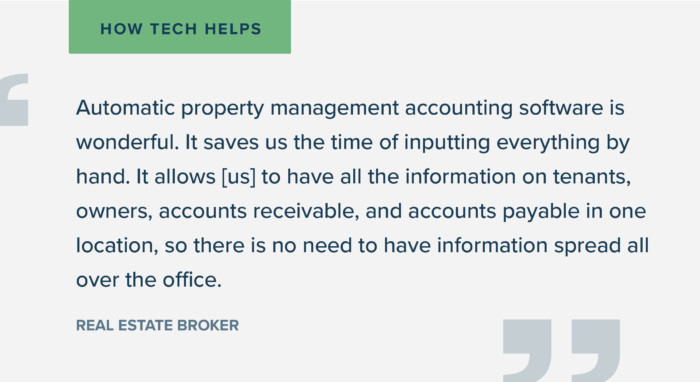
To help you find the best property management accounting software, here’s a checklist of the most important features you should look for:
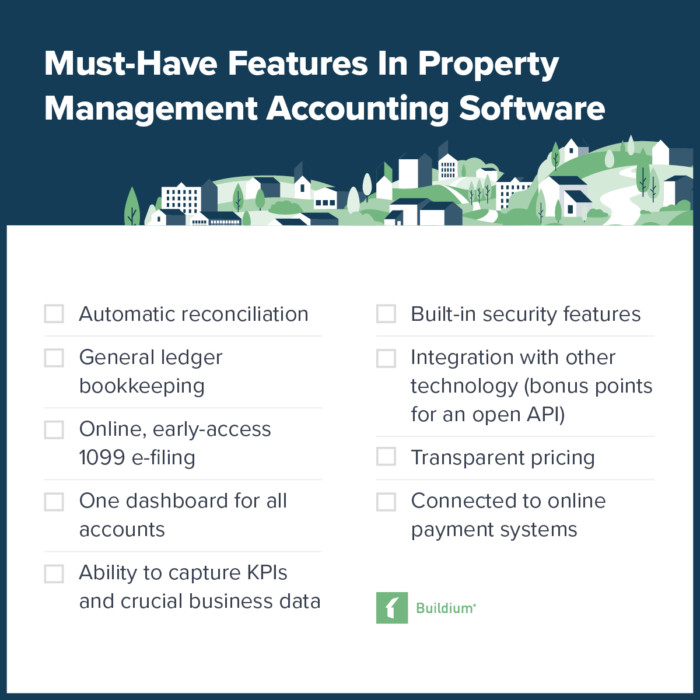
Technology To Help Your Business Grow
Once you’ve built up the right tech stack to meet your needs, it’s time to consider tools that help you plan for growth, attract new clients, and take on more doors. These are some of the most promising options out there to prepare your business for its next chapter.
Data and Analytics
Whether your growth strategy involves finding new properties to manage, expanding services with existing clients, or unlocking additional revenue streams, data analytics tools can help you make the right move.
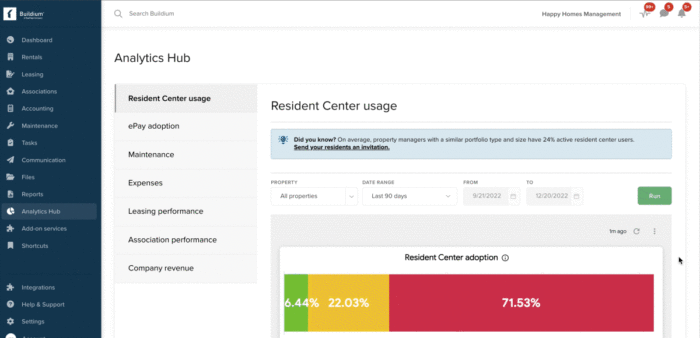
An Analytics Hub, like the one packaged within Buildium, gives you visibility into important metrics and KPIs across every aspect of your business. You’re able to set and track your own goals and compare how you’re faring against industry benchmarks. This gives you a clear roadmap for growth and lets you spin up customized reports to share with clients to demonstrate your company’s value and win new business.
Your Digital Brand
Growing your company gets a lot easier when you have a strong online presence. A website is the home of your digital identity and is often the first impression potential clients have of you. An effective property management website doesn’t have to be too fancy, but it does have to feel professional and feature the right details that encourage owners to reach out.
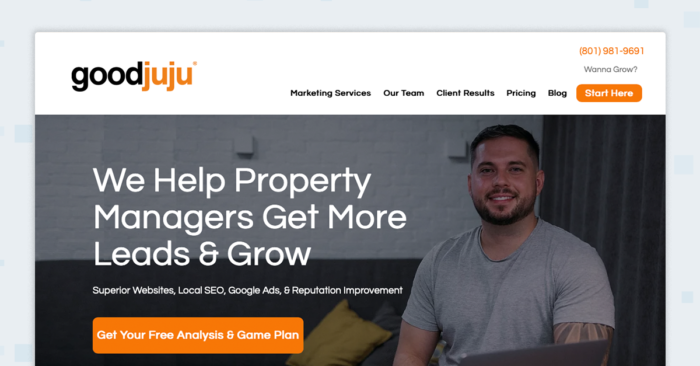
If you don’t already have developer talent on your team, lean on website creation and hosting tools that do most of the backend work for you. To really stand out, use a specialized service like Goodjuju that designs websites specifically for property managers.
You’ll want to add content to the website that clearly defines your brand, values, the quality of your service (including testimonials), and any advantages you have over the competition. A specialized web service can make all of these elements stand out to the right audience.
Once you’ve built an attractive, professional website, look into search engine optimization (SEO) opportunities and use tools like local Google Ads to target owners in your area. Again, Goodjuju and similar services can take care of this for you.
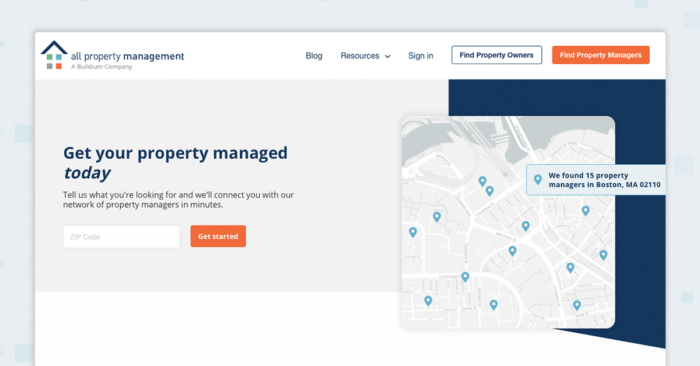
Many rental owners also search through dedicated property management company databases and marketplaces like All Property Management to find a partner, so make sure your business is listed on those sites as well.
The Tools You Need, All in One Place
To recap, keep all the areas we’ve explored above—leasing, communication, accounting, operations, and growth—in mind when selecting the right property management software for your needs. Remember that, regardless of your specific challenges, the tools you use should be able to integrate with each other, so you can run your business with less effort and greater visibility.
We may be a bit biased, but Buildium’s platform brings together the best property management tools and technology in a package that’s both extensive and easy to use. You can even try us out for free to make sure it’s a good fit.
Investing in property management software can be far from straightforward and feel like a lot of effort at first. But, if you understand your business and use this guide to find the right technology, you’ll be rewarded with more time, more profits, and the ability to focus on the parts of the job that you love.
Download our free Property Management Software Checklist.


